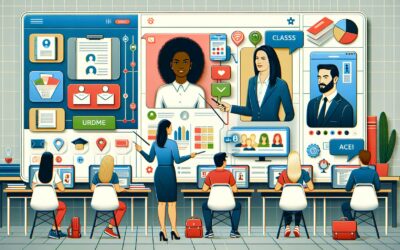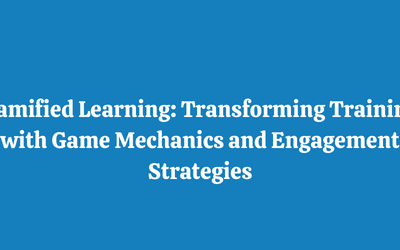Innovative Horizons: Emerging Scope of AI in Corporate Learning
In Conversation with Pradeip Agarwal, Chief Operating Officer, Stratbeans Learning Solutions
 We have witnessed the digital revolution unfold, marked by the innovation of computers, the internet, and smartphones. Today, it is essential to understand and adjust to the universe of Artificial Intelligence as it is everywhere, fast, and disruptive for ever-changing economic models. AI in workplace learning is also evolving quickly, with an immense potential to upskill/reskill employees, spur product innovations, and facilitate organizational growth. We talked to Pradeip Agarwal, Chief Operating Officer at Stratbeans Learning Solutions, to get his insights on the growing impact of AI in learning and development. Read the full interview for his expert insights on the vast potential of AI in the realm of learning and how AI will unleash new opportunities for future growth and success for businesses.
We have witnessed the digital revolution unfold, marked by the innovation of computers, the internet, and smartphones. Today, it is essential to understand and adjust to the universe of Artificial Intelligence as it is everywhere, fast, and disruptive for ever-changing economic models. AI in workplace learning is also evolving quickly, with an immense potential to upskill/reskill employees, spur product innovations, and facilitate organizational growth. We talked to Pradeip Agarwal, Chief Operating Officer at Stratbeans Learning Solutions, to get his insights on the growing impact of AI in learning and development. Read the full interview for his expert insights on the vast potential of AI in the realm of learning and how AI will unleash new opportunities for future growth and success for businesses.
Q 1- Today, the world is curious about AI’s future in learning. How has AI revolutionized workplace learning strategies, and what do you consider the ‘Catalysts of Change’ with this transformation?
A- Artificial Intelligence plays an important role in changing our lives and economy, and it has already left a considerable impact on the world in ample ways. With anything new, there is always a flood of thoughts and ideas, and the same happened with AI when it came up with a blend of practical innovations and case concepts last year. There are two significant aspects. First, it brings curiosity and excitement among the people. Second, implementing a new technology like AI and aligning it with specific business needs is undoubtedly challenging.
The biggest catalyst of change is the increased awareness and easy adoption of new technology. There is no need for an expert to implement this technology, and that is the edge, as anybody can leverage the benefits of AI to fulfil their business requirement.
Q 2- Could you share insights on how corporate leaders perceive the impact of AI on workforce engagement and skills enhancement within the L&D context?
A- The first thing that comes to my mind when asked about the impact of AI in L&D is that AI should be complementing and not contradicting. Many people grapple with the challenge of adopting smart technology, so AI must encourage them to engage and upskill and not compete with them. Also, AI must reduce not-so-productive but significant tasks, enabling individuals to focus on growth ideas and forge a path for career advancement and organizational success.
Q 3- How do you think different industries addressed multiple challenges when integrating AI into learning, and what best practices have emerged since then?
A- A majority of studies emphasize the growing influence of AI and how it will have a significant economic impact on almost every industry. I see a massive race amongst organizations for what’s trending rather than looking for the right fit for their bespoke business needs. So, the first challenge is to identify challenges (both at the organizational and industry levels) and then align them with business goals to determine what needs to be done and how AI-driven solutions can help address the same rather than just following the top trends.
So this is the major challenge that industries face today; therefore, more than staying in the AI game is required. Organizations need to identify optimal AI solutions to meet those challenges to enable success in the long run.
Q 4- How do you picture the future of AI in corporate learning, and what innovations do you anticipate will transform the L&D landscape in 2024?
A- With an emerging scope of AI in learning, it has become necessary for organizations to gauge which processes can be automated, which tasks can be augmented, and which tasks might evolve in the future. Based on this, organizations can devise efficient L&D strategies to navigate business challenges and identify potential solutions to address them. In my opinion, the future of AI lies in
- Anything that will mitigate the clerical staff effort
- Anything that will bring collaborative learning and ground reality to the forefront
- And anything that will come as ‘Pay Per Use’ or ‘Pay Per Outcomes’ considering the budget constraint
In a nutshell, the above picture of the future of AI in learning may help organizations to prepare for an AI-driven future, empowering their workforce to familiarize themselves with the automation of business processes and Generative AI tools for content generation and formulating strategies for upskilling and retention to prepare a future-ready workforce.
Our News
- AI
- Animations
- Articulate
- Articulate 360
- Articulate Engage
- Articulate Live
- Articulate Presenter
- Articulate Quizmaker
- Articulate Replay
- Articulate Review
- Articulate Storyline
- Articulate Storyline 3
- Articulate Studio
- bite sized learning
- Characters
- Content Library
- Corporate Communication
- E-Learning
- e-Learning Authoring Tools
- Employee Engagement
- Game-Based Learning
- Gamification
- Gamiflexer
- Go Sales
- Healthcare
- Instructional Design
- Interactivity
- Knowledge Transfer
- L&D Trends
- Learning
- Learning & Development
- Learning Experience platform
- Learning Management System
- LMS
- LXP
- Microlearning
- mLearning
- Mobile Learning
- Nugget Learning
- Online Training
- Peek
- Performance Support
- Preso
- Quiz and Assessment Platform
- Replay 360
- Rise
- SCORM
- Screen Capture
- Software
- Storyline 360
- Studio 360
- Training Management
- Trainings
- Uncategorized




